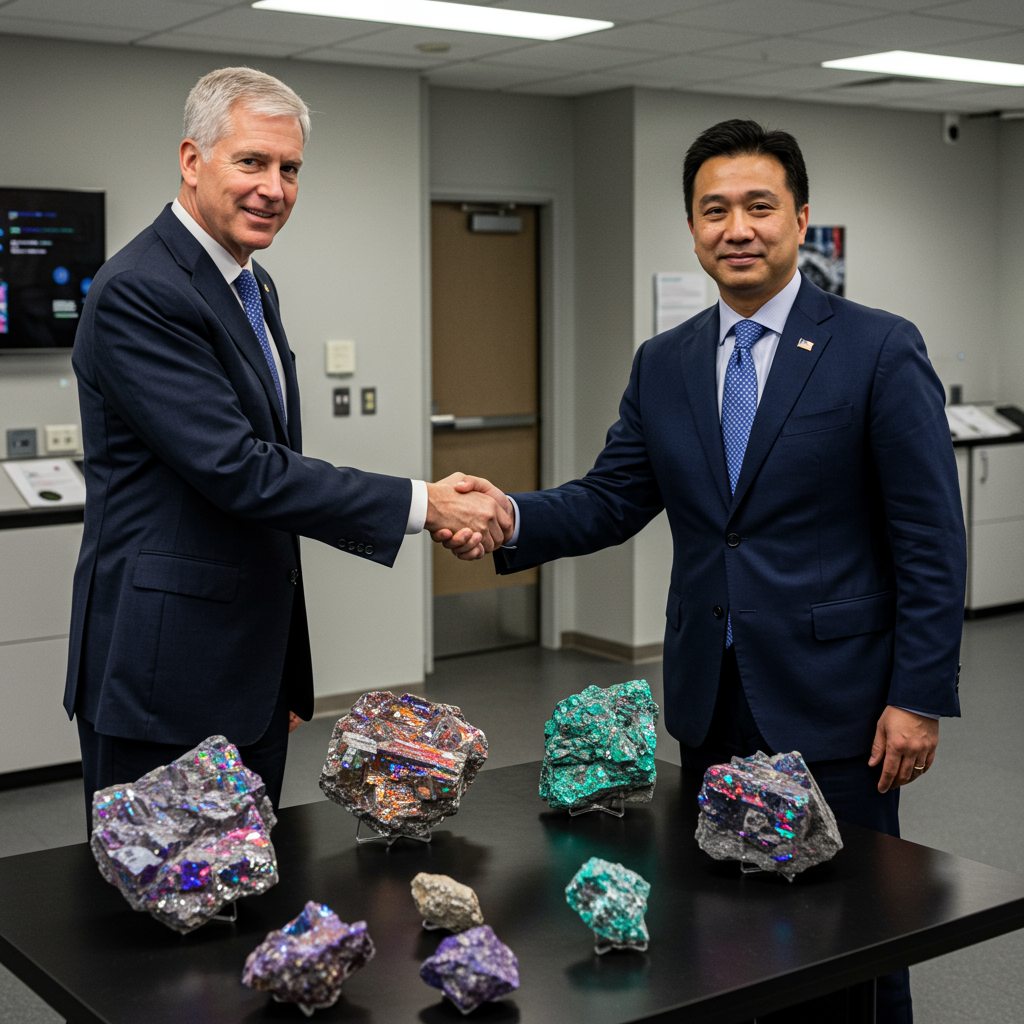The United States government is making a monumental push to secure its critical mineral supply chain, with a significant investment in domestic rare earth production. This strategic move is designed to dramatically reduce America’s heavy dependence on foreign adversaries, primarily China, for the materials vital to modern technology and national security. At the heart of this effort is a major investment in MP Materials, the owner of the sole operational rare earths mine in the U.S. located at Mountain Pass, California. This initiative is framed as a decisive action to accelerate American supply chain independence and shore up access to these indispensable elements.
Why Rare Earths Matter: Powering Modern Technology and Defense
Rare earth elements (REEs) are a group of 17 chemically similar metals found in the Earth’s crust. Despite their name, they aren’t exceptionally rare in terms of occurrence, but commercially viable concentrations are uncommon. Their unique magnetic, luminescent, and electrochemical properties make them irreplaceable components in countless advanced technologies.
These materials are essential for permanent magnets used in electric vehicles (EVs), wind turbines, smartphones, robotics, artificial intelligence systems, and even medical equipment like MRI scanners. Beyond consumer tech, rare earths are critical for defense applications, including guidance systems, radar, drones, and fighter jets like the F-35, which reportedly requires over 200 kilograms of REEs for various components. Ensuring a stable, secure supply of these minerals isn’t just an economic priority; it’s a matter of national security and technological leadership.
China’s Dominance in the Global Market
For decades, China has held a near-monopoly on the global rare earth supply chain. Through strategic long-term investment, aggressive government policies, and historically less stringent environmental regulations compared to Western nations, China built overwhelming dominance. Estimates vary slightly by source and year, but figures suggest China controls approximately 60-90% of global rare earth mining capacity and a staggering 85-90% of refining and processing capacity. This means even raw materials mined elsewhere often had to be sent to China for the complex steps needed to turn them into usable forms.
This concentration of power gives China significant leverage. Concerns have mounted that Beijing has used its position to manipulate prices, disadvantage competitors, and, more recently, impose export restrictions on critical minerals like gallium and germanium, impacting global supply chains. This dominance became a flashpoint in recent trade disputes, highlighting America’s vulnerability.
U.S. Government Investment and Strategy
To counter this reliance, the U.S. government is taking direct action. Under a recent agreement with the Department of Defense, the government is set to become the largest shareholder in MP Materials. This involves purchasing $400 million worth of newly created shares in the company.
Beyond the equity stake, the government is providing critical long-term support. For the next ten years, it commits to guaranteeing MP Materials a minimum price of $110 per kilogram for its output of neodymium and praseodymium (NdPr). These two rare earths are particularly vital for high-strength permanent magnets, making this price floor a significant step towards market stability for the domestic producer. This type of support is seen as crucial to protecting nascent U.S. rare earth growth from potential price dumping by dominant foreign players.
Boosting Domestic Processing Capacity
A major bottleneck in the U.S. supply chain has been the lack of refining and processing capacity. While the Mountain Pass mine extracts raw rare earth materials, much of it historically had to be sent overseas for processing into usable metals and alloys. MP Materials previously sent its output to China for refining, partly due to market dynamics and infrastructure availability. However, this practice ceased following the escalation of the U.S.-China trade war and reciprocal tariffs (U.S. 145%, China 125%). MP Materials stated that exporting to China became commercially unviable and misaligned with U.S. national interests.
As part of the government agreement, MP Materials is now committed to building a new facility in the U.S. to significantly increase its capacity to process raw materials domestically. This facility will serve both defense and commercial customers, drastically reducing the need to send materials abroad for refining. This domestic processing capability is seen as a vital step towards a truly independent U.S. supply chain.
A Multi-Pronged Approach to Security
The investment in MP Materials is part of a broader, multi-pronged strategy by the U.S. government to secure its critical minerals supply chain. This approach involves several key pillars:
- Direct Domestic Investment: As exemplified by the MP Materials deal, this includes equity investments, price guarantees, and funding for processing infrastructure under programs like the Defense Production Act (DPA) Title III, which targets critical supply chain security.
- Streamlining Permitting: While environmental protection remains essential, experts argue that bureaucratic delays in permitting new mining and processing projects in the U.S. need streamlining to accelerate development. This isn’t about bypassing environmental review but removing unnecessary hurdles.
- Exploring Alternative Sources: The U.S. is looking beyond traditional mining. This includes:
- Strategic Stockpiling: The U.S. Department of Defense has identified targets for stockpiling critical rare earth materials to ensure readiness.
Recycling: Recovering rare earths from end-of-life products (like electronics, EVs, and magnets) offers a faster, potentially lower-cost, and more environmentally friendly path. Companies like CoTec Holdings, through its HyProMag USA joint venture, are advancing projects like a rare earth magnet recycling facility in Texas using innovative technology (HPMS) to produce recycled magnets with minimal processing. This facility targets producing 750 metric tons annually by 2027.
International Partnerships: The U.S. is actively seeking to secure supply chains outside of China by supporting projects in allied nations. For instance, the U.S. Export-Import Bank (EXIM) has shown interest, including a potential Letter of Interest (LOI) for significant financing (up to $292M) for projects like Victory Metals’ rare earths and gallium project in Australia, highlighting interest in non-Chinese sources for critical materials like gallium used in semiconductors.
These efforts signal a significant policy shift, reinforced by executive orders, including one reportedly invoking wartime powers in March 2025 to accelerate critical minerals supply chain strengthening amidst escalating trade tensions.
The Path Ahead and Market Impact
Establishing a fully integrated domestic rare earth supply chain is a complex undertaking. It requires substantial capital, faces technical challenges, involves long development timelines, and must navigate regulatory hurdles. However, the confluence of government backing, geopolitical urgency, and strong demand drivers from defense, AI, EVs, and clean energy sectors creates a powerful tailwind.
Companies strategically positioned in this space, particularly those with domestic resources, plans for processing, or innovative recycling methods, are attracting increased investor interest. MP Materials’ stock has reportedly seen significant gains, reflecting positive market sentiment regarding its strategic role and potential government support. The U.S. initiative is part of a global trend where nations are prioritizing securing essential materials locally or from trusted partners to mitigate supply chain vulnerabilities and shape future economic policies.
Frequently Asked Questions
What are rare earths and why are they important to the US?
Rare earth elements are a group of 17 minerals vital for advanced technologies like electric vehicles, wind turbines, smartphones, and defense systems such as fighter jets. Their unique properties, particularly for making powerful magnets, make them indispensable. For the U.S., securing access to rare earths is crucial for national security, economic competitiveness, and technological leadership.
Where is the main U.S. rare earths production facility receiving government support?
The primary U.S. facility receiving significant government investment is the Mountain Pass mine in California. This mine, owned by MP Materials, is the only operational rare earths mine in the United States. The U.S. government is becoming the largest shareholder in MP Materials and providing long-term price guarantees for key rare earths produced there.
How is the U.S. government trying to reduce reliance on China for rare earths?
The U.S. government is employing several strategies: making major investments in domestic producers like MP Materials (including equity and price guarantees), supporting the development of U.S. processing facilities to avoid sending raw materials abroad, exploring recycling technologies, fostering international partnerships with allies to diversify supply sources, and potentially streamlining domestic project permitting. The overall goal is to create a resilient U.S. supply chain independent of China’s dominance.
Conclusion: Building a Resilient Future
The U.S. government’s substantial investment in domestic rare earth production, particularly through MP Materials, signals a decisive commitment to building a resilient and independent supply chain. This move, supported by broader initiatives like exploring recycling and international partnerships, directly addresses critical vulnerabilities posed by foreign dominance in this vital sector. While challenges remain, the strategic importance of rare earths for defense, technology, and the clean energy transition means that efforts to secure domestic supply will likely continue to accelerate. This push isn’t just about minerals; it’s about securing America’s future technological edge and national security in a competitive global landscape.




